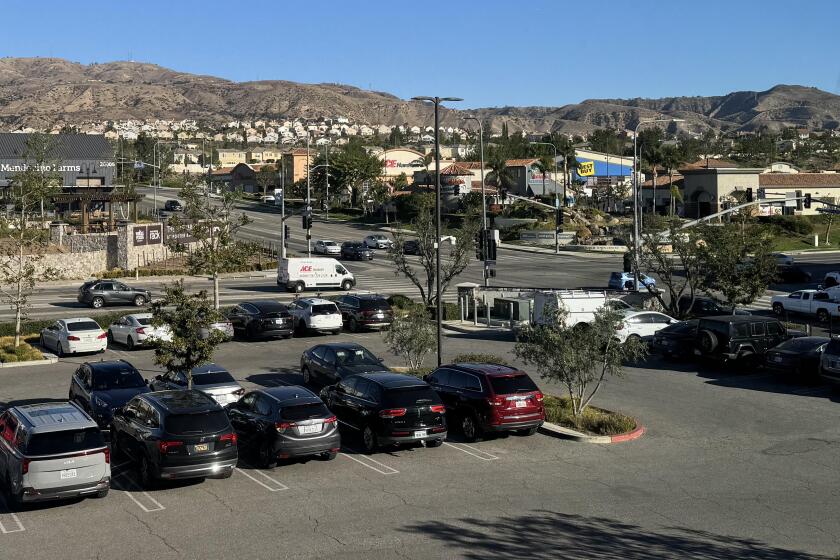Jim Murray Wins a Pulitzer Prize
- Share via
NEW YORK — Jim Murray, veteran sports columnist for the Los Angeles Times, won the Pulitzer Prize for commentary today while in a rare action, the Pulitzer board awarded two gold medals for public service, one to The Philadelphia Inquirer and one to the Washington (N.C.) Daily News.
It is the first Pulitzer for Murray, who has been named America’s best sports writer by the National Assn. of Sportscasters and Sportswriters 14 times. He began his career at The Times in 1961 after serving as West Coast editor for Sports Illustrated. Over the years he has won many awards for his baseball prose, for best column writing, and in 1977 was installed in the national sportscasters and sportswriters Hall of Fame.
Murray, 70, was cheered and toasted by his colleagues in The Times’ newsroom.
“One of the good thing about winning is when I play golf with Conrad he can’t criticize me by asking, ‘How many Pulitzers do you have?’ ” Murray said, referring to Times cartoonist Paul Conrad, who has won three Pulitzers.
The Inquirer won its public service gold medal for reporting by Gilbert M. Gaul that disclosed that the American blood industry operates with little governmental regulation and supervision. The Washington (N.C.) Daily News won for revealing that its city’s water supply was contaminated with carcinogens, a problem that local government had neither disclosed nor corrected over a period of eight years.
The Pulitzer in Music was given to “Duplicates: A Concerto for Two Pianos and Orchestra” by Mel Powell which was premiered by the Los Angeles Philharmonic in January.
The prestigious prize for drama was awarded to “The Piano Lesson” by August Wilson, while the award for fiction went to Oscar Hijuelos for his book, “The Mambo Kings Play Songs of Love.”
Sebastian deGrazia, author of “Machiavelli in Hell,” won the prize for biography, while the history prize went to Stanley Kranow for “In Our Image: America’s Empire in the Philippines.”
Two newspapers were cited for the their coverage of the San Francisco earthquake last October. The entire staff of the San Jose Mercury News won the general news reporting prize for its work on the quake and its aftermath, and the Oakland Tribune won the spot news photography prize. One particularly poignant photo by Roy H. Williams showed a woman being rescued from the lower deck of the Cypress Street viaduct after that stretch of highway had collapsed.
Lou Kilzer and Chris Ison of the Minneapolis St. Paul Star-Tribune won the investigative reporting price for exposing a network of local citizens and members of the St. Paul Fire Department that profited from fires, including some described by the fire department as being of suspicious origin.
David A. Vise and Steve Coll of the Washington Post won the explanatory journalism prize for stories scrutinizing the Securities and Exchange Commission and the way it had been affected by its former chairman John Shad.
The specialized reporting prize went to Tamar Stieber of the Albuquerque Journal. The Pulitzer board cited him for “persistent reporting,” in linking a rare blood disorder to an over-the-counter dietary supplement, Tryptophan. The articles were followed by a national recall of the product.
Also nominated as a finalist in the category was Claire Spiegel of the Los Angeles Times for investigation of mismanagement and abuses at the Martin Luther King/Drew Medical Center in Los Angeles. Her stories led to reforms at the hospital. The other finalist was Jim Dwyer of New York Newsday for his coverage of the New York City subway system.
The Seattle Times was given the National Reporting prize for its coverage of the Exxon Valdez Oil Spill and its aftermath. Reporters cited were Ross Anderson, Bill Dietrich, Mary Ann Gwinn and Eric Nalder.
Nicholas D. Kristof and Sheryl WuDunn of the New York Times won the International Reporting prize for the paper’s coverage of China’s mass movement toward democracy last spring and the subsequent repression.
The feature writing prize was given to Dave Curtin of the Colorado Springs Gazette Telegraph for what the Pulitzer jurors called “a gripping account of a family’s struggle to recover after its members were severely burned in an explosion at their home.”
David C. Turnley of the Detroit Free Press won the feature photography prize for photographs of the political uprisings in China and Eastern Europe.
The criticism prize was given to Allan Temko of the San Francisco Chronicle for his articles on architecture, while Thomas J. Hylton of the Pottstown, Penn., Mercury won for editorials about a local bond issue for the preservation of farmland and other open spaces in rural Pennsylvania.
Tom Toles of The Buffalo News won the editorial cartooning prize for a year’s work, exemplified by a cartoon about the First Amendment. The cartoon pictured the White House and Capitol with language citing various threats to the amendment.
The prize for poetry went to Charles Simic for his work “The World Doesn’t End” while the general nonfiction award went to Dale Maharidge and Michael Williamson for their book “And the Children After Them.”
More to Read
Go beyond the scoreboard
Get the latest on L.A.'s teams in the daily Sports Report newsletter.
You may occasionally receive promotional content from the Los Angeles Times.










